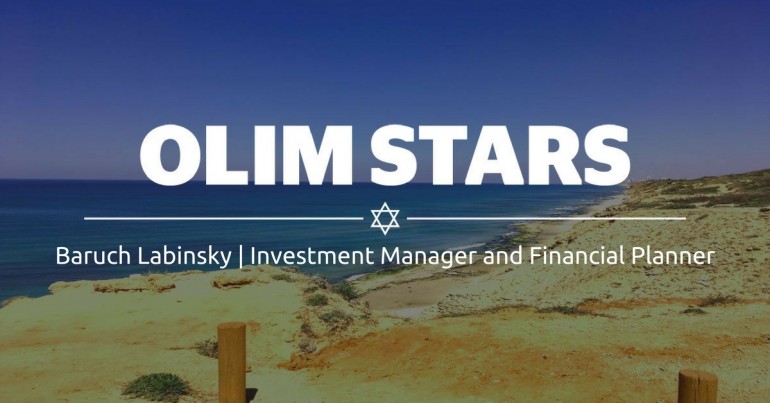
Hi Baruch! Would you mind telling us a bit about yourself?

Baruch Labinsky:
My wife and I made Aliyah in 1993 from Canada, and our family has lived in Ramat Beit Shemesh since 2001. I am a licensed Portfolio Manager with the Israel Securities Authority, and the founder of Labinsky Financial, a company that specializes in investment management in Israel as well as general financial planning. Our approach is to help people to cut through the financial haze and make the critical financial decisions so necessary in structuring their finances.
How did you get involved in the Olim Community? More so with Nefesh B’Nefesh?

Baruch Labinsky:
As an oleh I am naturally a part of the olim community. Very early on in my financial career in Israel I realized that olim – despite everyone being unique – face very similar financial challenges when coming on Aliyah. And obviously having made the move myself, I could empathize fully with their situation, while my financial background and training gave me the tools to help them.
I made Aliyah before Nefesh b’Nefesh was on the scene, so I didn’t benefit from their all-encompassing help. As an oleh working to help other olim, naturally my path crossed with Nefesh b’Nefesh and I was asked to start speaking with them here and abroad to provide olim with pre and post Aliyah financial information. It’s a special privilege to work with Nefesh b’Nefesh and to participate in their Aliyah fairs.
What impact do you personally have on this community here in Israel?

Baruch Labinsky:
I try to help olim prepare for Aliyah and set down proper financial foundations in Israel which can help them achieve a solid financial future in Israel. With all the excitement and happiness involved in realizing a dream and making Aliyah, if the olim don’t have financially stable lives in Israel, it lessens their ability to ‘make it’ here. And I try to do everything in my power to prevent that failure.
What main piece of advice do you give to those coming to you with financial questions – more specifically in Israel?

Baruch Labinsky:
Plan! It’s crucial that everyone has a realistic personal financial plan that incorporates all the elements of their financial life – income and expenditure, debt and asset management. And when you have that plan – ensure you’re flexible enough to re-evaluate and make the necessary changes over time to ensure you remain on the correct course.
What inspired you to go into the finance world?

Baruch Labinsky:
My involvement with various non-profit organizations and exposure to the day-to-day problems that families face if they aren’t educated, brought me to want to help others specifically with financial management. Finances are such a critical element in everyone’s daily interactions with their spouse, family, and even general community that helping others with financial stability is really a lifelong chessed.
What do you find the main mistake Olim make when they move to Israel?

Baruch Labinsky:
Unfortunately, many people live beyond their means, and the ability to pay in installments in Israel for practically everything encourages bad saving habits. If you spend more than you earn, or spend exactly what you earn but are not managing to save anything, you need to rethink your strategy.
How does the finance world differ in Israel, versus that in America?

Baruch Labinsky:
Here in Israel there is far less room for error. You need much clearer priorities and to be able to focus on your goals. Also, due to the different nature of the financial system, big mistakes can unknowingly be made very often. For example, taking out a mortgage that doesn’t suit your needs, could well cost thousands of shekels extra for many years. People think that things work here like they did in their home country, but they need to see that the reality here is different.
What other achievements have you accomplished?

Baruch Labinsky:
My book ‘A Financial Guide to Aliyah and Life in Israel’, has been incredibly well received by both potential and veteran olim. The book contains useful information and pointers on crucial major financial topics. It walks people through the Israeli insurance, investment, banking and tax systems among the other general financial planning topics like living on an Israeli budget and retirement planning in Israel. Israel has a unique financial system which is vastly different from the financial situation in my readers’ countries of origin. If anyone has financial issues prior to Aliyah, there is no doubt that they will become more complicated post-Aliyah. So whatever the stage – pre or post – the issues must be addressed to ensure a financially stable life in Israel. One of my goals in writing the book was to help my reader achieve greater financial clarity and save time and money navigating the Israeli system. Judging from the feedback to date I am grateful that I seem to be achieving that goal.
Any other tips, advice, or personal stories you can share to help those who have recently made Aliyah, or are planning to?

Baruch Labinsky:
My main advice is that regardless of your age and your financial situation, make sure that you have a financial plan and a retirement plan in place. If you are young, then don’t think you’ve got decades until you have to deal with retirement. Capitalize on the fact that in those decades you can accumulate very significant sums to fund your retirement, without feeling that you are cutting back. Those who only start planning later in life often need to reduce their expenditure to ensure that they can put something aside for their retirement.



